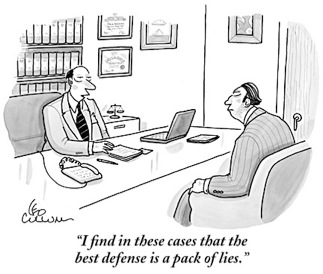A dream:
You are on a beach of golden sand. You have a large bucket, large enough to carry a million dollars’ worth of golden sand. You put a scoop of sand in the bucket. Then another. With each scoop, you feel richer. But then you notice something. The bucket isn’t getting fuller. There is a hole in the bottom, out of which sand is escaping.
You work faster, hoping to fill the bucket by adding more sand quickly. Yet, as fast as you fill it, the sand escapes. Still you move faster, and still the bucket will not fill. In fact, the level of sand in the bucket is getting lower!
This is the problem with trying to get richer through debt. Debt allows you to have things that you can’t afford. But there is a cost to it. And sometimes the cost is very high—so high that, no matter how hard you work, the wealth you hoped to acquire disappears.
At some rudimentary level, we all understand that debt is dangerous. But in our daily lives, many of us view it as a necessity. We buy homes with it. And cars. And boats, and toys, and vacations. Some use debt to buy the basics: clothes, food, and furniture.
Debt is not necessary. It is a luxury. Sometimes debt is useful. Sometimes it is wasteful. But debt is always dangerous.
I had my first serious run-in with debt when I was thirty years old. My wife K and I were renting a condominium in Washington, D.C. Our landlady came to us with an exciting opportunity: We could buy the condo for $60,000 with no money down. For just a hundred dollars a month more than what we were already paying for rent, we would be paying a mortgage. It sounded like a great deal, so we took it.
What we bought was a negatively amortizing mortgage with a three-year term and an 11% interest rate. What that meant was, every three years we were paying $19,800 in debt service and another $3,000 in closing costs.
We didn’t realize what was going on because our monthly payments were only $550. I was too foolish then to ever ask myself, “What is the cost of this debt?”
I tried to find another bank to take me out of this scam but none would. The mortgage we had signed was not backed by the government (Freddie Mac/Fannie May), which meant that no other bank would touch it.
It was like the dream with the leaking sand. Our golden condominium was nothing but fool’s gold.
And we were the fools. I wasn’t able to get us out of that deal until years later when I was wealthy enough to pay off the mortgage. Even after calculating the rental value of living in that condo, the deal cost me more than $30,000, and I had nothing to show for it.
I learned that when banks make it easy to borrow money, it’s not because you are a nice, deserving person. I learned that if you can get a loan despite poor credit (as ours was at the time), there is usually a scam involved. It also taught me to always ask the two critical questions about debt, “How much will it cost?” And, “Can I afford it?”
It was an expensive lesson. But the lesson seemed cheap thirty years later when, in 2005, the real estate market bubbled out of the pot. I sold my speculative properties and got out of the market. I made and saved millions, while my friends who ignored my warnings got killed.
Debt is unnecessary and it is dangerous.
It is unnecessary because there are always less expensive ways of getting what you want. And it is dangerous because it can sometimes be very expensive.
Let me give you two examples.
Let’s say that, like most Americans, you are in the habit of buying things with credit cards. After a while, you notice that you have accumulated $30,000 in total debt. You decide to cut up your cards and repay your debt. You can devote $400 a month to paying it back. How long will it take, and how much will it cost you?
The answer may surprise you. It will take you ten years to pay off the credit card debt. And your total payments will be $47,428. Of that, $13,278 will have been in interest payments.
Or let’s take a $150,000 home on which you take a $120,000 loan with a 6.5% interest rate. The mortgage payments are $914 a month, which you can afford. But how much will that house really cost you? Including interest payments? You will end up paying $329,303 for that house. Almost half of that—$153,050—will have been to interest payments.
The commercial community (bankers and manufacturers) doesn’t want you to be afraid of debt. And neither does the government, as I explain in the box. These institutions want you to like debt. They want you to use it. They want you to go into debt because it is good for them.
When you take out a mortgage to buy a home, or sign a lease on a car, or use credit cards to pay for your lifestyle expenses, the commercial community profits. The manufacturers make money on products you may or may not need. And the banks make money on your debt.
The mainstream financial media rarely talks about the dangers of debt. That’s because they make their profits from the financial institutions and manufacturers whose advertisements support their publications.
And the government actually encourages its citizens to take on debt. This was the recommended strategy for getting us out of the Great Recession that the (second) Bush administration (and the Federal Reserve) advocated and it’s the same scheme that Obama’s people are advocating today.
Debt is like a cancer. It lurks within. It guts your wealth, while you are paying attention to other, seemingly more important things. Then one day, it breaks through and gives you a fever. You call in the doctors and they cut you open, only to have them find the mess that is your financial body. The doctors then sew you up and walk away.
Here’s what you should know about debt:
As a general rule, you should live without it. You should find other, less expensive ways to acquire the things you need.
There are some cases where debt makes sense. I’ll talk about that at the end of this essay. But let’s look at what you should not do.
Unless you are wealthy, don’t lease your car. Buy it. Buy the car you can afford, not the car you believe will make you happy. Any non-appreciating asset (such as a car) will never make you happy if you have to pay its debt service. I didn’t buy my first luxury car until I was a multimillionaire.
Don’t buy anything with a credit card. Keep only one credit card for renting cars. Use a debit card to buy clothes and groceries. If you don’t have enough money in your bank account to use your debit card on a purchase, don’t buy it. If you don’t have enough money in the bank to buy something, it means you can’t afford it.
If you can’t afford the debt on your house, sell it (if you can) and buy something cheaper. In any case, start paying off the principle balance of your house (the amount you owe, not the interest you will owe) as fast as you can. Make it a goal to own your house free and clear as soon as possible.
If you have debt, pay it off as fast as you can, but not before you have filled up your bucket for emergency savings. By emergency savings, I mean money you will need to pay your bills if you lose your job. Six months’ income is what some financial advisors recommend. I’d recommend a year. It may take you that long to replace your lost income.
Pay off your debt even if the interest rate is low. In theory, you should put your extra money elsewhere if you can earn more on it than you are paying in interest. If, for example, you can get 4% in municipal bonds and you have a student loan at 2%, it makes more sense to buy municipals bonds and pay your student loan off slowly. But in reality, the extra 2% you are earning on the spread is not worth the risk in carrying the debt.
When I started earning money, the first thing I did was get rid of that terrible loan on the condominium I told you about earlier. The next thing I did was pay off the mortgage I took on a home. I paid it off in two or three years, even though it was a thirty-year mortgage. I loved the idea of owning my home free and clear. So I put every extra dollar I had toward paying down that mortgage. The bank didn’t like it, but the day I tore up that montage…I felt like I had been emancipated from financial slavery.
If you are troubled by debt, know this: you can get out of it just as I did.
When you are debt free, you can begin to use debt strategically. But to do so, you must always ask two critical questions: How much will it cost? Can I afford it?
Buying cash-flow real estate properties is one such example. Real estate values in many markets today are as low as they’ve been in ten or twenty years. And mortgage rates, at 3%-5% for people with good credit, are very low. This makes sense.
It may also make sense to take on debt to finance a business. But again, you have to be very careful. You must be sure that the return you are getting on your debt is guaranteed to be considerably higher than the cost of the debt.
But I don’t want to leave you with a happy feeling about debt. Debt is unnecessary. And it is dangerous. So get rid of it as fast as you can.







